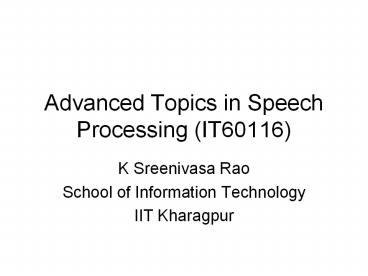Advanced Topics in Speech Processing (IT60116) - PowerPoint PPT Presentation
1 / 17
Title:
Advanced Topics in Speech Processing (IT60116)
Description:
Title: PowerPoint Presentation Last modified by: School of Information Technology Created Date: 1/1/1601 12:00:00 AM Document presentation format – PowerPoint PPT presentation
Number of Views:231
Avg rating:3.0/5.0
Title: Advanced Topics in Speech Processing (IT60116)
1
Advanced Topics in Speech Processing (IT60116)
- K Sreenivasa Rao
- School of Information Technology
- IIT Kharagpur
2
Objectives of the course
- Illustrating usefulness of signal processing
tools for the analysis and processing of speech. - Highlighting efficient utilization of
communication resources by exploiting the speech
production and perception properties. - Explaining various issues involved in the
processing of speech for human-computer
interaction. - Describing existing speech processing systems
like speech recognition, speaker recognition and
text-to-speech synthesis. - Giving exposure to the research issues involved
in the speech processing area.
3
Need for speech processing
Speech Natural mode of communication among
human beings Message, Speaker
information and Language information Language
constraints Legal sound units
Legal sequence of legal
sound units Why speech processing ?
Man Machine
Man
M STT TTT TTS
M
M/C
4
Need for human-machine interface
- Automatic dictation
- Voice response systems
- Voice based person authentication system
- Forensic investigation application
- Language identification
- Information (data) retrieval (voice-based)
- Speech-to-speech conversion applications
- Speech enhancement
- Speech coding
5
Speech tasks required for M/C interface
Speech Recognition Speech-to-Text Speech
Synthesis (TTS) Text-to-Speech Speaker
Recognition Speech Speaker
identity Language Identification Speech
Language identity Speech Enhancement Noisy
speech Clean speech Speech coding Speech
Encoder Channel Decoder Speech
6
Features for various speech tasks
- Features to characterize sound units
- Features to characterize a speaker
- Features to characterize the language
- Features to represent the articulator movements
- Features to characterize speech, nonspeech,
noise and reverberation - Features for coding and reproduction of speech
7
Scope of the Course
- Introduction (1)
- Acoustic Phonetics (3)
- Speech signal processing methods (4)
- Speech signal analysis approaches (8)
- Modeling techniques for developing speech systems
(12) - Speech systems (12)
8
Scope of the Course (Cont..)
- Introduction
- Acoustic phonetics
- Classification of sound units
- Production aspects
- Time and frequency domain realizations
- Excitation and vocal tract system characteristics
- Processing of speech signals
- Spectral domain representation
- Source-system representation
- DFT and its properties
- Pole-zero realizations
9
Scope of the Course (Cont..)
- Speech analysis methods
- Filterbank analysis
- Time-domain features of speech signal
- Linear Prediction (LP) analysis of speech
- Cepstrum analysis
- Sinusoidal analysis of speech
- Harmonic plus Noise model (HNM) analysis of
speech - Group-delay analysis of speech
10
Scope of the Course (Cont..)
- Models used for developing speech systems
- Introduction to statistical pattern recognition
- Classification strategies
- Probability density estimation techniques
- Vector quantization (VQ)
- Gaussian Mixture Model (GMM)
- Hidden Markov Model (HMM)
- Neural Networks (NN)
- Support Vector Machines (SVM)
11
Scope of the Course (Cont..)
- Speech systems
- Speech coding
- Speech recognition
- Speaker recognition
- Speech synthesis
- Language recognition
- Speech enhancement
12
Assignments
- Familiarity with speech recording, playback and
editing software - Effect of sampling and quantization
- Recording and analysis of speech sounds
- Time domain analysis of speech
- Spectral analysis of speech using STFT
- Spectral analysis using different windows
- Sinusoidal analysis/synthesis of speech
- Linear predication analysis/synthesis of speech
- Cepstral analysis of speech
- Estimation of pitch and formants from speech
- Synthesis of vowels
- Development of prototype speech recognition
system
13
Assignments (Cont..)
- Voiced/unvoiced (speech/nonspeech) detection
(Energy, ZCR, ACF, AMDF) - Vowel recognition using Filter-bank approach
- Vowel recognition using ZCR (realization of
filter-bank using ZCR) - Vowel recognition using
- vector quantization
- GMM
- HMM
- Multivariate Gaussian distribution
- K-Nearest Neighbour
- ANN
- SVM
14
Assignments (Cont..)
- Prototype speech recognizer
- Speaker recognition
- Language Identification
- Text-to-Speech synthesis
- Speech Enhancement (Noise subtraction)
15
Text books
- L. R. Rabiner and R. W. Schafer, Digital
processing of speech signals, Pearson Education,
LPE, New Delhi, 2005. - L. R. Rabiner and B. H. Juang, Fundamentals of
speech recognition, Pearson Education, LPE, New
Delhi, 2003. - D OShaughnessy, Speech communication Human and
Machine, Second Edition, IEEE Press, NY, USA,
1999. - J. R. Deller, Jr., J.H.L. Hansen and J.G.
Praokis, Discrete-time procesing of speech
signals IEEE Press, NY, USA, 1999. - T. F. Quateri, Discrete-time speech signal
processing Principles and practice, Pearson
Education, LPE, New Delhi, 2004. - B. Gold and N. Morgan, Speech and Audio Signal
Processing, Wiley Student Edition, Singapore,
2004. - J. Benesty, M. M. Sondhi and Y. Huang, Springer
Handbook on Speech Processing, Springer
publishers, 2008. - X. Huang, A. Acero and H. W. Hon, Spoken
Language Processing, Printice-Hall, Inc., 2001
16
References
- IEEE Trans. Audio, Speech and Language Processing
- Speech Communication (Elsivier)
- Computer Speech and Language (Elsivier)
- Journal of acoustical society of America (JASA)
- IEEE Int. Conf. Acoust., Speech, Signal
Processing (ICASSP) - Int. Conf Speech Processing (INTERSPEECH)
17
Course Evaluation Details
- Quiz-I 5 End of January
- Mid-Sem 25 End of February
- Quiz-II 5 End of March
- End-Sem 50 End of April
- Assignment15































